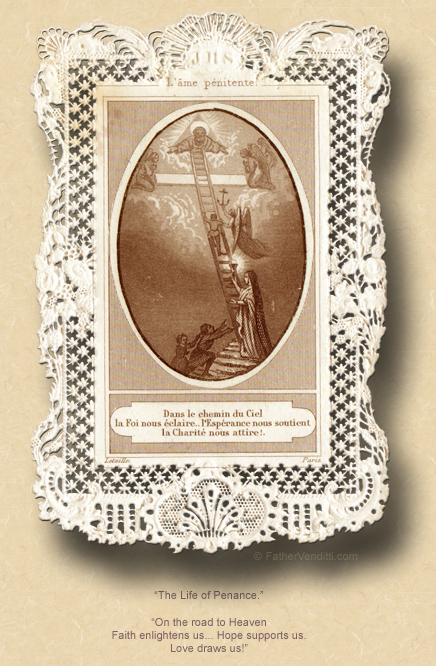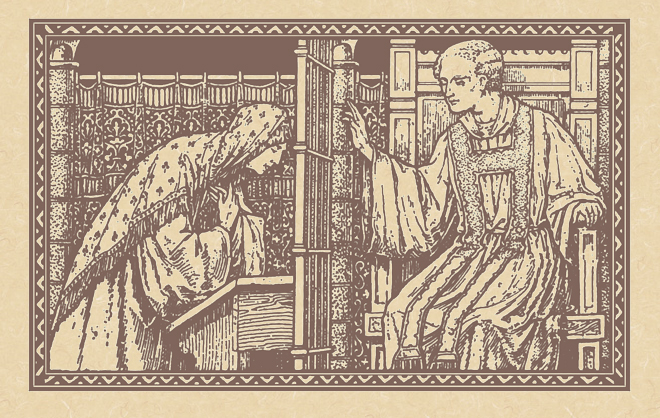Don't Be Afraid to Blush.
The Second Monday of Lent.
Lessons from the feria, according to the ordinary form of the Roman Rite:
• Daniel 9: 4-10.
• Psalm 79: 8-9, 11, 13.
• Luke 6: 36-38.
Lessons from the feria, according to the extraordinary form of the Roman Rite: • Daniel 9: 15-19.
• [Gradual] Psalm 69: 6, 3.
• [Tract] Psalm 102: 10.
• John 8: 21-29.
FatherVenditti.com
|
 7:13 AM 2/26/2018 — I hate getting technical during homilies, especially during the week, as it tends to put people to sleep, including myself whenever I have the early Mass, which I typically do because I’m off to the hospital directly afterward; but, the prayer of Daniel which forms our first lesson today is controversial inasmuch as Scripture scholars are not sure whether it was originally a part of the book, or whether it was added by someone later. It is, after all, identical with the words used by Nehemiah at the beginning of his prayer as found in the beginning of his book (cf. Neh. 1: 5). Why I even bother to mention that I can’t say; just chalk it up to the fact that I decided to have a glass of wine last night when I sat down to write this brief homily, and we’ll leave it at that. 7:13 AM 2/26/2018 — I hate getting technical during homilies, especially during the week, as it tends to put people to sleep, including myself whenever I have the early Mass, which I typically do because I’m off to the hospital directly afterward; but, the prayer of Daniel which forms our first lesson today is controversial inasmuch as Scripture scholars are not sure whether it was originally a part of the book, or whether it was added by someone later. It is, after all, identical with the words used by Nehemiah at the beginning of his prayer as found in the beginning of his book (cf. Neh. 1: 5). Why I even bother to mention that I can’t say; just chalk it up to the fact that I decided to have a glass of wine last night when I sat down to write this brief homily, and we’ll leave it at that.
In any case, Daniel’s prayer may be the most beautiful prayer of repentance in the Bible. It is a corporate prayer—he’s speaking not in behalf of himself, but for all his people—so it may be difficult for us as individuals to use it, but I think we can if we consider that our own relationship to our Blessed Lord is not wholly individual, but is always conditioned by the fact that we are members of a Church, which means that every prayer of ours, no matter how personal, is always prayed as part of a community of faith. It goes against the grain for me inasmuch as I’m usually focused, in my homilies, on our personal relationship with the Lord in the interior life, rather than on our place in the worshiping community. Another thing you’ll learn about me as time goes on is that I’m found of quoting, in my homilies, not from the translation of the Scriptures as found in our Missal, but from the translation done by Msgr. Ronald Knox, who died the year I was born, and whose Victorian prose is often florid and confusing to modern ears. He translates the last verses of our first lesson thus:
Fault with thee is none; ours, Lord, to blush for the wrong-doing that has offended thee, men of Juda, citizens of Jerusalem, Israel near at hand, Israel banished far away, in what plight thou seest! Blush we, king and prince of ours, fathers of ours that did the wrong; be it thine, O Lord our God, to have mercy and to forgive (Dan. 9: 7-9 Knox).
Daniel’s prayer is the quintessential prayer of repentance, and it wouldn’t be a bad practice to break out our Bibles now and then and read it as part of our daily examination of conscience. Even though Daniel is praying in behalf of everyone, his confession has personal significance when we remember his own history. Like all of us, Daniel has every reason to plead for God’s mercy, not only for his people, but himself. And so do we.
Our Gospel lesson today is so simple that it requires no explanation. The measure with which we forgive others is the measure with which we will be forgiven. No secret decoder ring needed there, but it’s good to be reminded of it anyway. And it is consoling to know that, in spite of our many sins, we can cancel them by being merciful to those whom we feel have wronged us.
All of it is summed up in today’s psalm: “Forget the long record of our sins, and haste in mercy to our side; never was need so sore as this” (Psalm 79 (78): 8 Knox). Again, Msgr. Knox’s translation. All of us are acutely aware of our sins, and I think that sometimes we do ourselves a disservice in judging ourselves too harshly. It is important to remember that all of the greatest saints went to their deaths convinced that they were the greatest of sinners. Don’t be afraid. Of course you have sins. So do I. So do all of us. During Lent we are trained to focus on our sins and confess them. All well and good. I would remind you that our next “Soup, Saints and Stations” this Friday offers a presentation of Pope Saint John Paul II. If ever there was a man who understood the importance of being aware of our own sinfulness it was this saintly pope, so I encourage you to attend.
As we continue our journey through this holy season of Lent, I ask you not to forget that, no matter how frightened we may be at confronting our sinfulness, the mercy of our Blessed Lord is boundless. All that he requires of us is that we abandon all excuses, and own up to everything we’ve done in confession.

|

